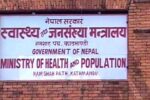JANAKPURDHAM: Kidney problem is more common in Nepali people working in Malaysia and Gulf countries, according to a study conducted at two local levels in Dhanusha district.
A study carried out in Laxminiya Rural Municipality and Kshireshwornath Municipality in Dhanusha district under the leadership of the Bournemouth University in the United Kingdom shows that kidney problem is more common among the Nepali people who returned home from works in the Gulf countries and Malaysia than those living in Nepal.
During the study, a comparison was made between those who have returned from jobs in five Gulf countries (Qatar, Saudi Arabia, Oman, UAE, Bahrain) and Malaysia, but have not completed one year after returning to Nepal and those who have not recently gone to the Gulf countries, said Dr Nirmal Aryal, a member of the research team.
According to him, the study was carried out in 718 people (all men), who have returned from employments in foreign countries and 720 people (370 men and 341 women) who have not recently gone for foreign jobs.
“When the ability of the ‘glomerular filtration rate considered the most important test to indicate the condition of kidneys was checked, there was a 5.8 percent decrease in the migrants and 3.6 percent in non-migrants,” said Dr Aryal.
Even among the non-migrants, more problems were found in former migrants than men and women who have never been abroad.
Likewise, the average of creatinine in the blood was also higher in the migrants than non-migrants.
The test examines the amount of creatinine in the blood and calculates how much blood kidneys filter in one minute.
A decreasing rate is considered to be deterioration in the functioning of the kidneys.
This also indicates increasing kidney problems among immigrants,” he said.
However, another examination for kidney problems shows that the amount of protein in the urine is higher in non-migrants than in migrants.
The study concludes that since kidney problem was more common among non-migrant women, a separate study is required to find its cause.
Likewise, the study found that the migrants who returned home from the Gulf countries and Malaysia are at high risks of suffering from blood pressure, diabetes and overweight or obesity as compared to non-migrants.
Migrants are at 38 percent risk to suffer from blood pressure as compared to non-migrants who are at 19.4 percent risk.
In case of diabetes, the migrants are at 74 percent risk as opposed to non-migrants who are at 4.7 percent risk, and migrants have 674 percent risk of overweight or obesity than non-migrants who have 49 percent risk.
As Dr Aryal said, those workers who work sitting at the same place for long hours, security guards and drivers and workers carrying out works under direct exposure to sun, outdoors and amidst dust and smoke are at high risk of renal diseases. Blood and urine samples were collected for this study and questionnaires were administered later.
Another member of the research team and Chief of the Provincial Public Health Laboratory, Janakpur, Dr Shrawan Kumar Mishra said about 90 percent of those who participated in the study were working in Qatar, Saudi Arabia and Malaysia, while more than two-thirds worked in construction and industry sectors.
Similarly, the participating migrants worked for 10.7 hours daily on an average and 30.9 percent of them did not stay on leave even for a day in a month on an average.
Likewise, 24.8 percent of the respondents said they had to do physically heavy works and almost half the respondents (44.4 percent) stated that they had to work in heat while approximately 97 percent of the migrant respondents said they had drinking water and toilet facilities at the work place, Dr Mishra said.
“Not only have the migrants, but the members of their families (specially their spouses) also had many health issues due to various sorts of stress Hypertension, diabetes and obesity is mostly seen among the migrants and therefore it is necessary to raise awareness about this in the destination countries itself. The Nepali Embassy and organisations working for the rights and welfare of the migrants should take special initiatives for this,” he reiterated.
The study was conducted by the Bournemouth University and Green Tara Nepal, an NGO, with the financial support from The Colt Foundation.
The Madhes Province Public Health Laboratory, the UN IOM and the University College London (UCL) had also assisted in the study.
It has been claimed that this study is the first kind of study conducted among the migrant Nepali workers and the non-migrants at the community level. Dr Pramod Raj Regmi (Bournemouth University, UK) was the lead researcher and his team comprised of researchers Dr Nirmal Aryal, Prof Dr Edwin Van Teijlingen, Prof Dr Arun Sedhai, Dr Radheshyam KC and Dr Shrawan Kumar Mishra, according to Green Tara Nepal.
RSS









Comment